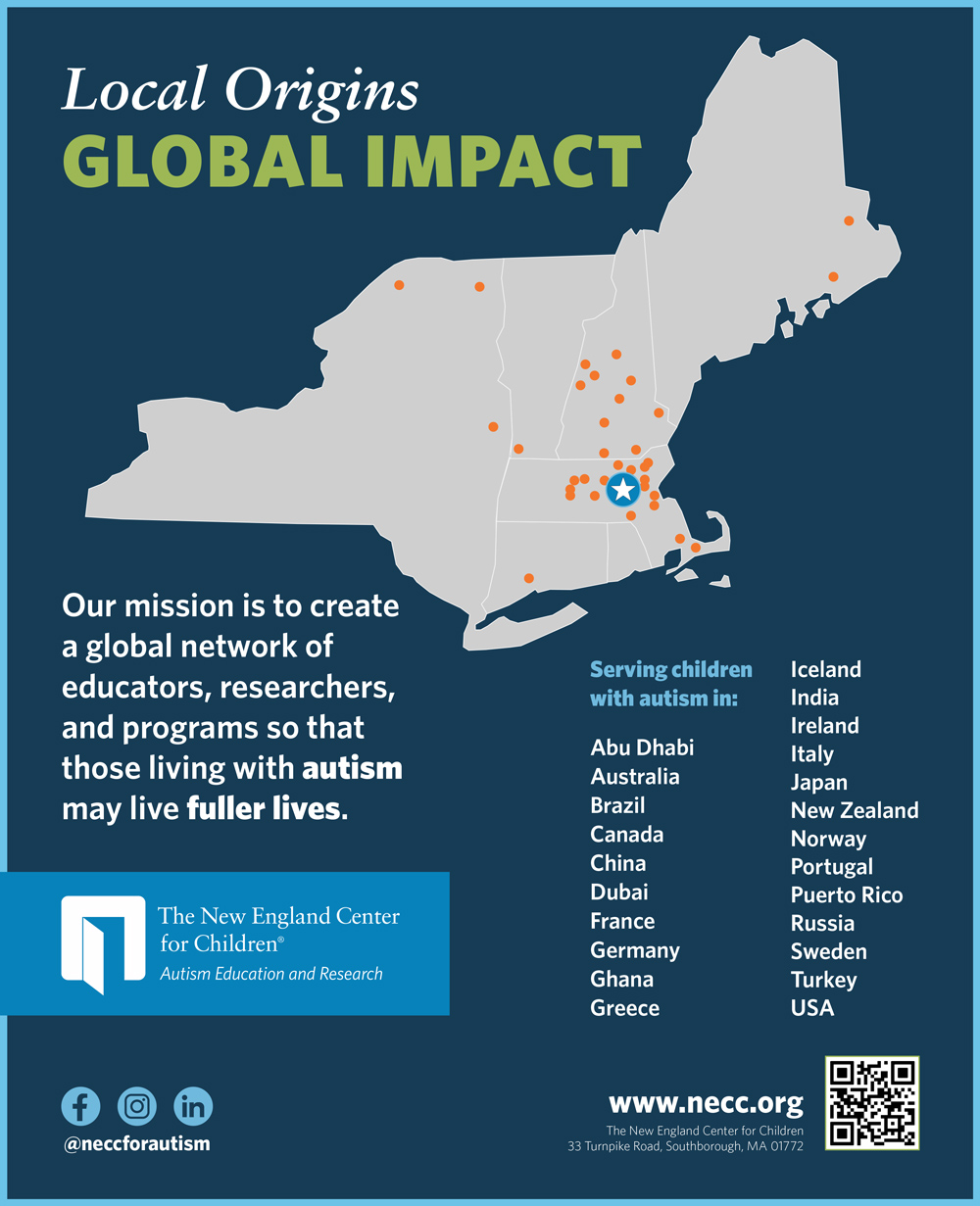Autism Spectrum News recently had the pleasure of speaking with Jessica Sassi, PhD, BCBA-D, LABA, who was appointed President and CEO of The New England Center for Children (NECC) in 2021. In this exclusive interview, David Minot, Publisher of Autism Spectrum News, speaks with Dr. Sassi about her journey to leadership at NECC and the organization’s innovative programs and services for children and young adults with autism.
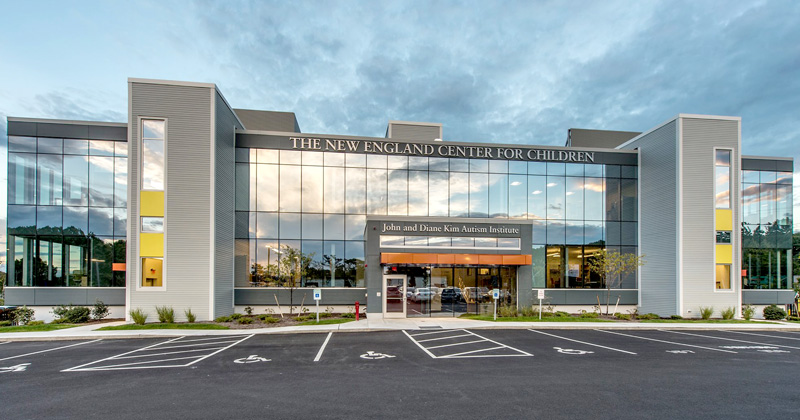
The New England Center for Children
David Minot: Please provide the readers of Autism Spectrum News with an overview of The New England Center for Children.
Jessica Sassi: We are a private, nonprofit, special education school in Southborough, MA. Our mission these past 48 years has been to create a global network of educators, researchers, programs, and technology to help each individual achieve their maximum potential. We want to ensure that autism is not a barrier to leading a full and happy life.
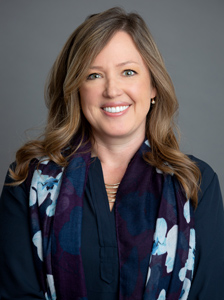
Jessica Sassi, PhD, BCBA-D, LABA
To that end, The New England Center for Children® (NECC®) delivers a comprehensive program of effective, evidence-based educational services to children with autism including academics, social and life skills development, speech and language therapy, occupational therapy, adapted physical education, and vocational training. We have close to 1,000 teachers and staff, a quarter of whom have advanced degrees and/or are board certified behavior analysts (BCBAs).
Our curriculum is based on the science of applied behavior analysis (ABA) – the only scientifically proven method for increasing positive behaviors and reducing those that may cause harm or interfere with learning.
Our day school and residential program serves just under 200 students aged 3 – 22. We reach many more students in the region through our Public School Services (PSS) department, where we offer a range of supports to school districts. Through PSS, we provide a BCBA consultant and a lead teacher to manage classrooms in local public schools. This enables students to benefit from NECC’s curriculum, without leaving their local school district. More than 800 students are served through our PSS programs.
I believe our commitment to high-quality professional development coupled with research-informed practice is the best way to serve our students and the greater community of individuals impacted by autism.
Currently, we offer three on-site graduate programs to our teaching staff through partnerships with Western New England and Simmons universities. Over the years, we have seen more than 1,750 master’s and doctoral degrees conferred to our staff through those programs.
NECC’s best practices and curriculum extend beyond our classroom walls through the Autism Curriculum Encyclopedia® (ACE®) ABA Software System. ACE is a software tool for educators who teach learners with autism. With more than 13,000 learners in 32 states and 10 countries benefiting from ACE, the software allows clients to create tailored lesson plans for their unique student’s needs.
Finally, we operate a school with the same comprehensive services in Abu Dhabi, serving 262 Emirati children and we offer consulting in clinics and community sites across the UAE and the world.
David: As the newly appointed CEO, we would love to hear about your personal journey within NECC that led you to this leadership role.
Jessica: I joined NECC in 2007 after finishing my doctorate in behavior analysis at the University of Florida. I joined NECC because I was looking for a career opportunity that would allow me to provide direct clinical services while also conducting research and mentoring graduate students. The New England Center for Children was one of the few places that offered both.
My first role was as a clinician in our residential program. Around the same time, I began teaching graduate courses in behavior analysis through Simmons University and Western New England University programs while growing my skills as a clinician and leader. I then became clinical director where I was responsible for oversight of all students’ programs.
When our founder announced that he would step down, I was selected to succeed him and embarked on a training plan to shadow him and prepare for the transition. During that time, I served as executive advisor and executive director of our Southborough programs before becoming President and CEO of the organization.
I can truly say that working at NECC provides a unique set of opportunities and skills. We have a strong commitment to mentorship and development of emerging practitioners as a way of serving the broader community of people impacted by autism. I was able to serve both as mentee and mentor in my time here and benefited deeply from both roles.
We are committed to excellence in everything we do – because those living with autism deserve nothing less. It’s a point of pride that we received the National Award for Model Professional Development from the U.S. Department of Education in 2000. It’s also the reason many staff celebrate their work anniversaries at 20, 30, and even 40 years; NECC is a great place to develop one’s career.
David: Staffing shortages are a common challenge for special education schools across the nation. How is NECC actively addressing this issue, and what strategies have you found effective in recruiting and keeping qualified professionals on your team?
Jessica: I view staffing shortages as the cumulative impact of several factors: Declining enrollment in universities, especially in education; fewer young people in the workforce in New England; and competition with sectors that have greater flexibility. Other industries can offer significant wage increases and flexible work requirements (such as remote or hybrid schedules that are impossible for direct care positions).
We have responded with creative solutions without compromising our values. One example relates to our most appealing benefit for new teachers – free graduate school. We can recruit and retain individuals who want a career in behavior analysis or special education by providing graduate classes onsite at little to no cost to our employees. We worked with Simmons University and Western New England University, our partnering colleges, to allow for greater work-life balance (such as adding a remote option for one program).
In addition, we provide ongoing training for our staff, from annual refreshers to continuing education units (CEUs) for their professional licenses. We offer online coursework for Registered Behavior Technician® certification as well as introductory classes on the principles and application of ABA to paraprofessionals.
Another strategy that has helped is increased recruitment overseas. We have a number of staff that have joined us from our programs in the United Arab Emirates and from around the world, and they are bringing new experiences and perspectives to our work. It’s been terrific.
Tactics that all schools could consider include investing in inclusive leadership training for junior and senior staff, supporting employee resource groups, and providing ample community-building activities. I feel there is a greater societal need for an emphasis on wellness, and we are constantly enhancing our Employee Assistance Program and benefits packages to help meet that need.
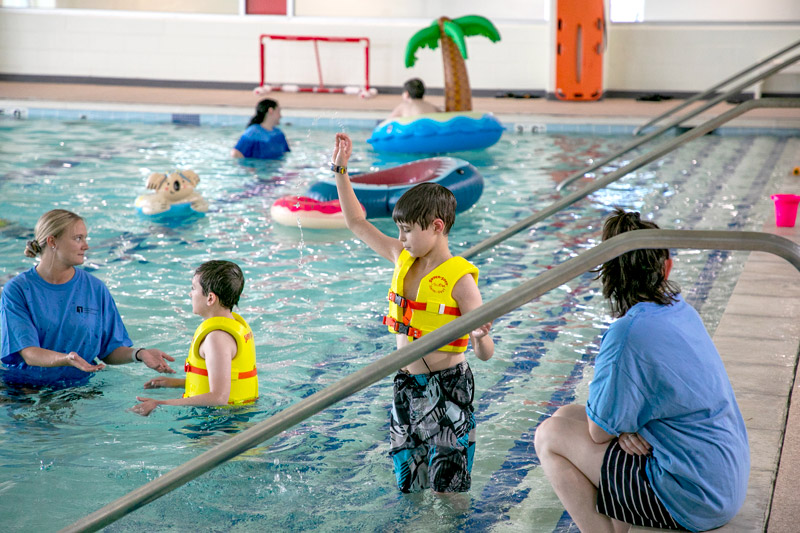
The Michael S. Dukakis Aquatic Center at NECC where students learn physical education, swim skills, and water safety
David: NECC’s international schools are quite unique. Could you share the story behind their establishment and how they contribute to NECC’s mission and impact?
Jessica: NECC has been working with children with autism in Abu Dhabi and the Middle East for more than 25 years. We originally started consulting to families in the United Arab Emirates and established ourselves as experts in autism education and services. In 2006, we were invited to open a school as part of Abu Dhabi’s initiative to bring world-class healthcare and cultural institutions to Abu Dhabi. Our first classroom opened in 2007, and we moved into the current school building that was built to replicate our school in Southborough, in 2013. Five years later, the school was renamed the Mohammed bin Rashid Center for Special Education operated by The New England Center for Children, which now serves 262 children.
We further expanded our services in Gulf Cooperation Council countries with the opening of the Allied Health Clinic in Dubai, a pediatric specialty clinic that provides one-on-one or group therapy services for a variety of diagnoses and severity levels.
In addition, our Global Consulting has served more than 300 students through its consultative services and work in Abu Dhabi, Dubai, and Qatar. These clinics and community-based services provide applied behavior analysis (ABA), occupational therapy and speech and language services to children and their families. We have helped students with autism in Kuwait City, Kuwait; Gurgaon, India; Riyadh and Dammam in Saudi Arabia; and in Brazil, Australia, Italy, England, and Canada.
Our mission is not only to help children with autism today, but to prepare teachers and behavior analysts to help exponentially more children for years to come. Being recognized as a leader in the field here and around the world means we are frequently called on to share our expertise widely. It’s a call we will always answer.
In 2015, we received the Award for International Dissemination of Behavior Analysis from the Society for the Advancement of Behavior Analysis (SABA), the peer academic organization of applied behavior analysis. The highly respected award is given to a person or organization demonstrating a significant and sustained contribution to the dissemination and development of ABA outside of the United States.
David: Technology plays an important role at NECC. Regarding the dissemination of best practices, the ACE ABA Software System seems like an innovative tool for reaching teachers and students everywhere. Please tell us about ACE and its role at NECC.
Jessica: With our focus on maximizing independence for our students, technology plays an important role. Many students use augmentative and alternative communication (AAC) devices to help them communicate their thoughts and needs. Students also use devices for following instructions or “steps” on tasks. This is especially relevant to vocational training.
Technology in our classrooms includes SMART boards where teaching can be interactive. Additional programming from Mystery Science online curriculum to IXL math and reading programs further learning with today’s students who have been exposed to technology their whole lives.
Our most important technological advantage brings The New England Center for Children’s best practices beyond our classroom walls to practitioners everywhere. We compiled the curriculum we were successfully using with our students and developed a patented, cloud-based software platform (Autism Curriculum Encyclopedia®, or ACE® ABA Software System). We made it commercially available for educators and BCBAs who teach learners with autism wherever they live.
ACE offers the full range of NECC curriculum and experience. The software includes skills assessments, lesson plans, over 2,200 skills, a data collection module, and reporting features to illustrate and evaluate student progress.
With more than 13,000 learners in 32 states and 10 countries benefiting from ACE, the system allows clients to create the best ABA program that fits their needs. Our own research is added into ACE in real time, resulting in an ever-improving comprehensive educational tool for those serving learners with autism.
David: I visited and toured NECC a few years ago and was really impressed by the extensive research activities taking place. Can you provide some insight into the role that research plays at NECC?
Jessica: Research is in our DNA; it’s how we started in 1975, seeking to understand how children with autism best learn. Today research remains a cornerstone of all that we do. All of our educational approaches, our curricula, and our therapeutic interventions and supports are informed by research. We have several staff whose sole job responsibility is dedicated to research, as well as many senior clinicians that have active lines of research. These researchers and clinicians also supervise graduate students and junior colleagues on ongoing research projects. They identify challenges they see in current students and design studies to improve efficacy of the teaching method.
Ultimately, the results of those research projects, as well as ongoing research shared by other behavior analysts, are incorporated into our practice and the ACE® ABA Software System – so that our educational and clinical practices are always being refined and informed by that research.
Our clinicians and researchers also share this knowledge through publication; we have published more than 300 papers in peer-reviewed journals and given 2,571 presentations at international conferences in 20 different countries. The Society for Advancement of Behavior Analysis (SABA) recognized The New England Center for Children for Enduring Programmatic Contributions in Behavior Analysis in 2005, and again in 2017 with the award for International Dissemination of Behavior Analysis.
David: You recently wrote an article for Autism Spectrum News titled “How to Overcome Dental Health Challenges for Children with Autism,” where you discussed NECC’s innovative in-house dental clinic. I would love to hear more about this initiative and the impact it has had on the children and families you serve.
Jessica: Yes, we are absolutely thrilled to have recently opened our in-house dental clinic. Dental care can be especially challenging for individuals with autism – the sights, sounds, smells, and sensations produced by dental care can be frightening and uncomfortable, and many individuals with autism have trouble tolerating dental visits. In addition, finding a practitioner who is familiar with the population and suitable accommodation can be difficult.
Earlier in my career at NECC, I helped supervise a research study that broke down a dental visit into smaller and more manageable steps, and we showed a way to desensitize a student with autism to a dental exam with this approach. Our students were much more successful after treatment, but the challenge was that we would still have to transport our residential students to a hospital in Boston for dental care.
Having the dental clinic in-house allows students to practice visiting the dentist before an appointment, which makes a tremendous difference. In addition, having a provider familiar with our students and who knows how to best support them has increased their success during appointments. And practically, having the clinic on-site means that less time and resources are committed to traveling to appointments. Instead, students can pop downstairs, have their dental appointment, and return to the classroom to re-engage in learning. It’s been amazing.
We are so grateful to Supersmile® and the New England Dental Group for this opportunity that has truly been a game-changer for our students and staff.
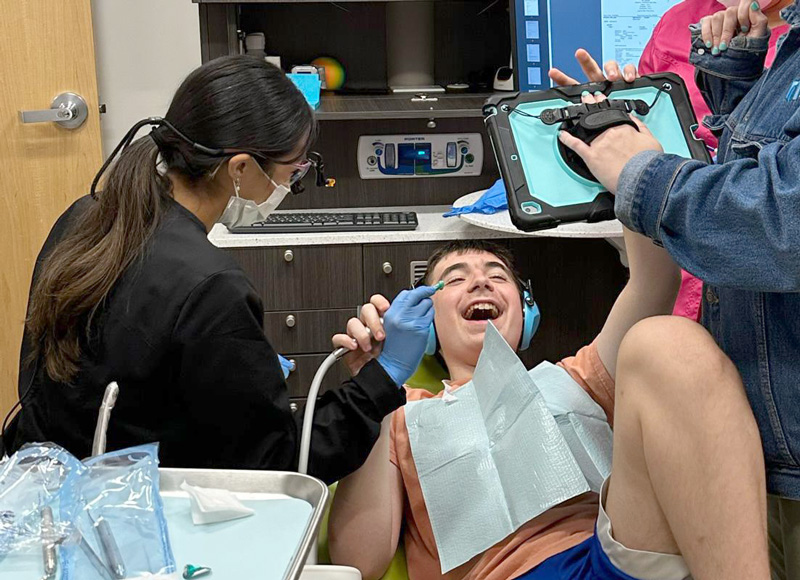
The New England Center for Children’s in-house dental clinic
David: To conclude our discussion, I would be interested to know your opinion on the greatest challenges autism service providers are facing today and the most effective ways to address them.
Jessica: Our biggest challenge – and this is true for most autism service providers – is finding mission-driven professionals to fill direct care positions. The workforce shortage that emerged in the last three years has hit education and behavioral healthcare very hard. Nonprofit service providers cannot compete with for-profit companies dangling remote opportunities, flexibility, and seemingly unlimited compensation. This field is not easy and certainly not glamorous.
That said, at NECC, we are finding creative ways to incentivize staff, encourage referrals, and offer more flexibility with scheduling. But we also believe that the intangible benefits of working with children with special needs provide great joy and fulfillment every day.
Creating a positive, supportive, and engaging workplace is key to retaining employees. The training and professional development programs I mentioned earlier are vital. I believe that staff development will not only make our program stronger but help to contribute to the greater autism community with well-informed, experienced, and thoughtful professionals.
I’ve also noticed the detrimental effects on quality care that private equity investors bring in their roll-up acquisition strategy. This is another challenge we face. We’ve seen the negative effects of these business practices in the bankruptcies and sudden closures of many schools, which negatively impact the reputation of our industry.
Finally, all providers struggle with local, state, and federal funding for special education. As an industry we must continue educating and lobbying our governments to raise awareness and funds for our important and life-impacting work.
For more information about The New England Center for Children, please visit www.necc.org or call 508-481-1015.

